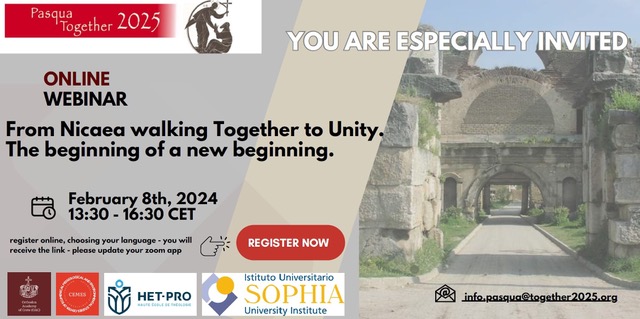(Bonn, 05.06.2024) The Council of Nicaea took place in 325. It is considered to be the first ecumenical council, which primarily focussed on Arianism and the question of the divinity of Jesus Christ, but also dealt with other topics such as the date of Easter and the ordination of priests and bishops. In 2025, the Council will celebrate its 1700th anniversary. Archbishop Dr. Thomas Paul Schirrmacher has now published his greeting on this anniversary from the webinar “From Nicaea walking Together to Unity: The beginning of a new beginning” on 8 February 2024.
Schirrmacher particularly emphasized the complementarity of biblical teaching, which Nicaea had captured perfectly: “The bishops at Nicaea did something being important far beyond Christology itself and its reference to the triune God, when achieving Christian unity on the basis of revelation in Jesus Christ and of the Holy Scriptures that testify to him. They did justice, in two ways, to the fact that revelation often appears to confront us as with a paradox, for which I personally like to use the newer, less negative-sounding term ‘complementarity’. First complementarity: the Creator is the Redeemer. The Nicene Creed begins with the Creator as the heading for the history of redemption and does not separate the two central elements of the Christian faith, creation and redemption, but sees them together. One without the other is unthinkable, is not the Christian faith. Second complementarity: Jesus Christ is both fully human from his conception in and birth through the Virgin Mary up to his death on the cross. But this man, who achieved redemption in obedience to his Father, is at the same time the eternal God, the Son of God and the one through whom the world was created and for creation exists.”
However, Schirrmacher also spoke of critical aspects that should be examined more closely, namely Nicaea as the definitive moment of the separation of Christianity from Judeo-Christianity and Judaism:
“We will also examine critical aspects of the Council, such as the role it played in the final distancing from Judaism and from the Jewish-Christian community that still existed at the time, especially in the context of the separation of the date of Easter from the Jewish Passover date and the establishment of Sunday as the only possible day for worship. There is still much research to be done here.”
The webinar “From Nicaea, Walking Together to Unity: the beginning of a new beginning,” happened as the Christian world is preparing to celebrate in 2025 the 1700th anniversary of the Council of Nicaea, which brought together for the first time bishops representing the whole of Christendom. The webinar offered deep reflections on the Council of Nicaea and its enduring legacy for Christians today.
The opening addresses were given by His All Holiness Ecumenical Patriarch Bartholomew, by the General Secretary of the World Council of Churches, Rev. Prof. Dr. Jerry Pillay, by Cardinal Kurt Koch, President of the Vatican’s Dicastery for Promoting Christian Unity, and by Archbishop Dr. Thomas Paul Schirrmacher, at that time still General Secretary of the World Evangelical Alliance.
The event was organized by the Pasqua Together 2025 (Easter Together 2025) initiative, which is calling for all churches to celebrate Easter on the same date, as currently Eastern and Western Christianity have different ways of calculating when Easter should fall.
Downloads and Links
- Greeting by Thomas Paul Schirrmacher: https://www.thomasschirrmacher.info/wp-content/uploads/2024/06/WEA_Letterhead_NICAEA_Febr_2024_English.pdf
- The programme of the webinar “From Nicaea walking Together to Unity: The beginning of a new beginning”: https://eiao.org/wp-content/uploads/2024/01/NICAEA-WEBINA-8.2.24-EN.pdf
- PASQUA Together 2025: An invitation to unify the date of Easter at the source of the Christian faith: https://www.jc2033.world/images/PASQUA_Together_2025-Kolybari_meeting.pdf


